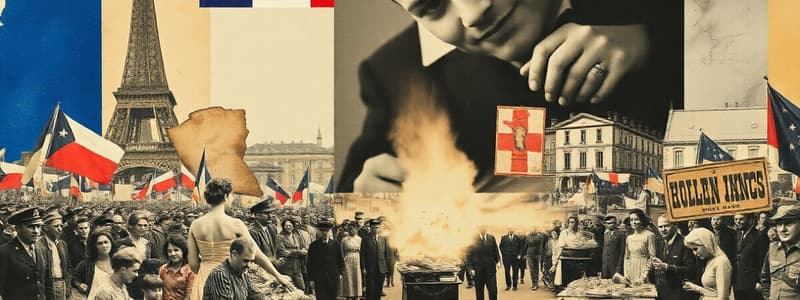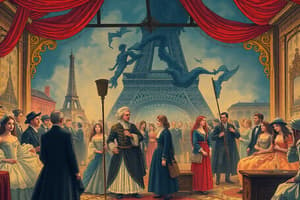Podcast
Questions and Answers
What was a significant consequence of the economic crisis in France leading up to the Revolution?
What was a significant consequence of the economic crisis in France leading up to the Revolution?
- The rise of the monarchy's popularity
- A reduction in tax burdens for the nobility
- Increased unity among the three estates
- Declining agricultural production due to crop failures (correct)
Which social class in France did not pay taxes and owned most of the land?
Which social class in France did not pay taxes and owned most of the land?
- First Estate
- Third Estate
- Bourgeoisie
- Second Estate (correct)
Who was King Louis XVI's wife and what was she known for?
Who was King Louis XVI's wife and what was she known for?
- Elizabeth of Austria; known for her charitable work
- Marie Antoinette; known for her lavish lifestyle (correct)
- Catherine de Medici; known for her political alliances
- Anne of Brittany; known for her military strategies
What was the main demand of the Third Estate during the Estates-General?
What was the main demand of the Third Estate during the Estates-General?
Which aspect contributed to France's power before 1763?
Which aspect contributed to France's power before 1763?
What did the National Assembly promise in the Tennis Court Oath?
What did the National Assembly promise in the Tennis Court Oath?
Which event is widely considered to mark the beginning of the French Revolution?
Which event is widely considered to mark the beginning of the French Revolution?
What did the Great Fear primarily result from?
What did the Great Fear primarily result from?
How did the National Assembly address the privileges of the 1st and 2nd Estates?
How did the National Assembly address the privileges of the 1st and 2nd Estates?
What group attacked Louis XVI’s palace during the September Massacres?
What group attacked Louis XVI’s palace during the September Massacres?
Who led the National Convention after the monarchy was abolished?
Who led the National Convention after the monarchy was abolished?
What was one major outcome of Louis XVI's execution in 1793?
What was one major outcome of Louis XVI's execution in 1793?
What was the primary goal of the Committee of Public Safety during the Reign of Terror?
What was the primary goal of the Committee of Public Safety during the Reign of Terror?
What was Robespierre's vision for France during the Reign of Terror?
What was Robespierre's vision for France during the Reign of Terror?
Which faction wanted to return France to the pre-Revolutionary state?
Which faction wanted to return France to the pre-Revolutionary state?
What was the primary aim of the Congress of Vienna concerning France?
What was the primary aim of the Congress of Vienna concerning France?
Who was the most influential figure at the Congress of Vienna?
Who was the most influential figure at the Congress of Vienna?
Which of the following was a long-term consequence of the Congress of Vienna?
Which of the following was a long-term consequence of the Congress of Vienna?
What was a reactionary movement that the Congress of Vienna supported?
What was a reactionary movement that the Congress of Vienna supported?
What was the concept introduced to prevent any one power from becoming too strong?
What was the concept introduced to prevent any one power from becoming too strong?
What was a significant reason for Napoleon's rise to power in France?
What was a significant reason for Napoleon's rise to power in France?
What major change did Napoleon implement after the coup d’etat?
What major change did Napoleon implement after the coup d’etat?
What was the purpose of the Continental System created by Napoleon?
What was the purpose of the Continental System created by Napoleon?
Which event marked the beginning of the decline of Napoleon's power in Europe?
Which event marked the beginning of the decline of Napoleon's power in Europe?
How did Napoleon demonstrate his authority during his coronation as emperor?
How did Napoleon demonstrate his authority during his coronation as emperor?
What was the outcome of the Battle of Austerlitz?
What was the outcome of the Battle of Austerlitz?
What was the primary reason for the rebellion in Spain against Napoleon's rule?
What was the primary reason for the rebellion in Spain against Napoleon's rule?
What ultimately led to Napoleon's first exile to Elba?
What ultimately led to Napoleon's first exile to Elba?
What key tactic did Russia employ during Napoleon's invasion?
What key tactic did Russia employ during Napoleon's invasion?
Flashcards
L'ancien Régime
L'ancien Régime
The French social system before the revolution, where society was divided into three estates: the clergy, the nobility, and everyone else.
Second Estate
Second Estate
The French nobility, who enjoyed special privileges like exemption from taxes and owned most of the land.
First Estate
First Estate
The French clergy, who also enjoyed special privileges, including exemption from taxes.
Third Estate
Third Estate
Signup and view all the flashcards
Estates-General
Estates-General
Signup and view all the flashcards
National Assembly
National Assembly
Signup and view all the flashcards
Tennis Court Oath
Tennis Court Oath
Signup and view all the flashcards
Storming of the Bastille
Storming of the Bastille
Signup and view all the flashcards
The Great Fear
The Great Fear
Signup and view all the flashcards
Declaration of the Rights of Man and Citizen
Declaration of the Rights of Man and Citizen
Signup and view all the flashcards
Church-State Relations
Church-State Relations
Signup and view all the flashcards
Legislative Assembly
Legislative Assembly
Signup and view all the flashcards
Sans-culottes
Sans-culottes
Signup and view all the flashcards
Jacobins
Jacobins
Signup and view all the flashcards
Reign of Terror
Reign of Terror
Signup and view all the flashcards
Congress of Vienna
Congress of Vienna
Signup and view all the flashcards
Balance of Power
Balance of Power
Signup and view all the flashcards
Restoration of Monarchies
Restoration of Monarchies
Signup and view all the flashcards
Concert of Europe
Concert of Europe
Signup and view all the flashcards
Weakening of France
Weakening of France
Signup and view all the flashcards
Napoleon's Corsican Origins
Napoleon's Corsican Origins
Signup and view all the flashcards
Napoleon's Coup d'État
Napoleon's Coup d'État
Signup and view all the flashcards
Napoleon's Rule in France
Napoleon's Rule in France
Signup and view all the flashcards
Napoleonic Code
Napoleonic Code
Signup and view all the flashcards
Napoleon's Vision for Europe
Napoleon's Vision for Europe
Signup and view all the flashcards
Napoleon's Coronation
Napoleon's Coronation
Signup and view all the flashcards
Napoleon's Conquests in Europe
Napoleon's Conquests in Europe
Signup and view all the flashcards
Napoleon's Continental System
Napoleon's Continental System
Signup and view all the flashcards
Napoleon's Invasion of Russia
Napoleon's Invasion of Russia
Signup and view all the flashcards
Napoleon's Exile
Napoleon's Exile
Signup and view all the flashcards
Study Notes
French Revolution Background
- France was most powerful from 1453 to 1763
- The Seven Years' War ended French dominance
- Success was due to centralization, absolute monarchy, high population, high production, exports, and mercantilism
- Louis XIV, the Sun King, famously declared "L'Etat c'est moi" (the state is me)
Social Classes in France
- Social classes had remained the same since the Middle Ages
- "Those who pray, those who fight, those who work"
- First Estate: Clergy
- Second Estate: Nobility
- Third Estate: Everyone else (Bourgeoisie, urban poor, and peasants)
- The Third Estate comprised 97% of the population and was pro-Enlightenment
- The First and Second Estates were anti-Enlightenment and did not pay taxes. The Second Estate owned most of the land.
King Louis XVI and Marie Antoinette
- King Louis XVI was deemed less capable than his predecessors
- He often took bad advice and was well-intentioned
- Marie Antoinette, from the Austrian Habsburg family, lived a lavish lifestyle that was unpopular with the French people
Economic Crisis
- High taxation to fund wars (Seven Years' War, American Revolution)
- Crop failures led to food shortages
- Marie Antoinette's extravagant spending worsened the economic situation
- King Louis XVI was forced to call the Estates-General into session to address the crisis
Estates-General
- An assembly made up of representatives from the three estates (representing clergy, nobility and general population)
- The Third Estate sought a representative government
- All estates had an equal amount of votes, but the Third Estate wanted to change this.
National Assembly
- The Third Estate declared itself the National Assembly
- They claimed to represent all of France
- This move was a significant step towards revolution
Tennis Court Oath
- The King locked out the National Assembly
- The delegates met in a nearby tennis court
- They pledged to stay until a new constitution had been drafted
Storming of the Bastille
- Parisians suspected King Louis would use force to disband the Assembly
- People wanted guns and ammunition
- They stormed the Bastille, a prison, to obtain them
- This event is considered the start of the French Revolution (1789)
The Great Fear
- Paris revolted; then the surrounding countryside
- Peasants already faced starvation and feared nobles were trying to starve them
- Peasant revolts erupted across France
- Thousands of women marched on Versailles demanding bread
French Revolution Declaration
- The National Assembly created a declaration of the rights of Man and the Citizen
- It included ideas of liberty, equality, and fraternity
- Members of the clergy and nobility joined the National Assembly
- The First and Second Estates' privileges were dissolved
Church-State Relations
- Church lands were seized to pay off France's debts
- Priests were now answerable to the state
- This was due to Enlightenment beliefs and angered French peasants.
Divisions Emerge
- Divisions arose amongst three major groups
- Those who sat on the left wanted radical reforms and no monarchy
- Those who sat on the right wanted a limited monarchy
- Those in the middle wanted change, but not as much as the left
Factions Outside the Assembly
- Sans-culottes: Urban working class who supported the Leftists
- Emigres: Nobles who fled France seeking to return to the pre-Revolutionary state
War and Violence
- European powers did not want the revolution to spread
- They tried to reinstate Louis' power
- Prussia and Austria formed an alliance and invaded France
- Parisians reacted by storming the palace and massacring royalist supporters
- The Legislative Assembly responded to violence and invasion, deciding to abolish the monarchy and elect a new government (National Convention)
- France officially became a republic
- France was now dominated by a radical faction called the Jacobins
Reign of Terror
- Maximillian Robespierre, leader of the Jacobin party and the Committee of Public Safety, had total authority to punish suspected traitors to the Republic
- During this period, approximately 40,000 people were executed, mostly regular citizens.
- Radicals wanted a secular society, removing all traces of old France
- Priests were executed, calendars changed, and Christianity replaced with atheistic, civic cults (the Cult of Reason).
- Internal opposition emerged, caused by the king's death, anti-religious laws, and the draft of 300,000 French citizens. A war in the Vendée broke out because of the draft and anti-Catholicism. The Republic engaged in total war in the Vendée, leading to the massacre of tens of thousands of peasants, including women, children, and priests.
Studying That Suits You
Use AI to generate personalized quizzes and flashcards to suit your learning preferences.




